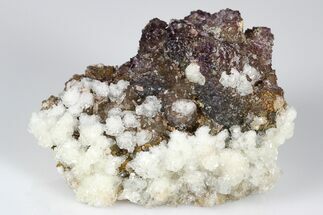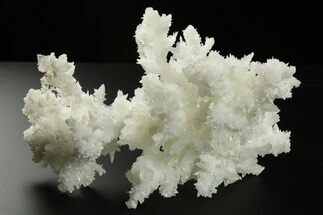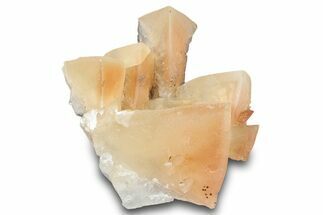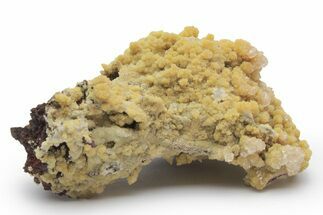This Specimen has been sold.
2.2" Vibrant-Red Cinnabar with Calcite - Cocineras Mine
This is a beautiful association of vibrant-red cinnabar and calcite crystals, collected from the Cocineras Mine in the Santa Eulalia mining district of Chihuahua, Mexico. Some gypsum can be found scattered throughout this specimen as well.
Cinnabar is a mercury sulfide mineral with the chemical formula HgS. It is a vibrant red color and is an important ore of mercury. It is primarily found as fillings within gaps of rocks and coating rocks as a result of ascending hydrothermal activity. While cinnabar is typically massive in habit, large crystals have been found on rare occasions. The striking red color of cinnabar made for an attractive pigment, but its use as a pigment was halted following discovery of its toxic properties.
Toxicity Warning: The mercury content of cinnabar can be harmful if absorbed into the bloodstream by inhalation or ingestion. The crystals do not pose a health hazard just sitting on a shelf, but it is highly recommended that you wear gloves and/or wash your hands after handling.
Toxicity Warning: The mercury content of cinnabar can be harmful if absorbed into the bloodstream by inhalation or ingestion. The crystals do not pose a health hazard just sitting on a shelf, but it is highly recommended that you wear gloves and/or wash your hands after handling.
About Calcite Crystals
Calcite crystals are a form of calcium carbonate (CaCO₃) known for their diverse shapes, transparency, and vibrant range of colors. They typically form in rhombohedral, scalenohedral, or prismatic shapes, often with well-defined, sharp edges and glossy surfaces. Calcite crystals are often translucent or transparent, sometimes displaying a double refraction effect where objects viewed through the crystal appear doubled. They can appear in various colors—white, clear, yellow, pink, blue, green, and orange—depending on impurities or trace minerals.
A notable characteristic of calcite is its reaction with weak acids like vinegar, which causes it to effervesce, or fizz, as it releases carbon dioxide. This property makes calcite crystals a key tool in geological identification and studies. Calcite forms in many environments, from sedimentary rocks like limestone and marble to hydrothermal veins.
Calcite crystals are a form of calcium carbonate (CaCO₃) known for their diverse shapes, transparency, and vibrant range of colors. They typically form in rhombohedral, scalenohedral, or prismatic shapes, often with well-defined, sharp edges and glossy surfaces. Calcite crystals are often translucent or transparent, sometimes displaying a double refraction effect where objects viewed through the crystal appear doubled. They can appear in various colors—white, clear, yellow, pink, blue, green, and orange—depending on impurities or trace minerals.
A notable characteristic of calcite is its reaction with weak acids like vinegar, which causes it to effervesce, or fizz, as it releases carbon dioxide. This property makes calcite crystals a key tool in geological identification and studies. Calcite forms in many environments, from sedimentary rocks like limestone and marble to hydrothermal veins.
SPECIES
Cinnabar, Gypsum & Calcite
LOCATION
Cocineras Mine, Santa Eulalia Mining District, Chihuahua, Mexico
SIZE
2.2 x 1.4"
CATEGORY
ITEM
#212739
 Reviews
Reviews













